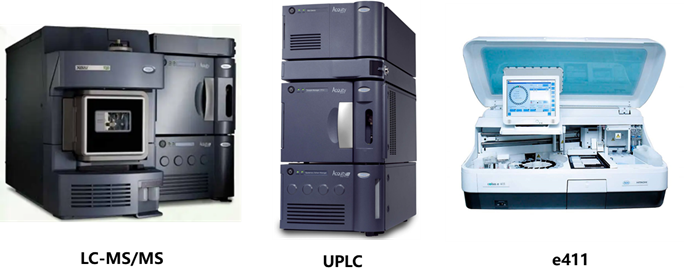
Nutrition Analysis and Evaluation Platform
The platform conducts laboratory and population analysis and evaluation studies on key nutritional issues in women and children. It is equipped with a range of large and medium-sized quantitative analysis instruments, including liquid chromatography-triple quadrupole mass spectrometer (LC-MS/MS), ultra-high-performance liquid chromatograph (UPLC), high-performance liquid chromatograph (HPLC), chemiluminescence immunoanalyzer, etc, which enabling the detection and evaluation of common essential nutrients such as 5-mTHF and 5-fTHF multi-subtype folic acid, vitamin A, and vitamin B12.

We combined laboratory analysis and population study methods to elucidate the nutritional status of pregnant women in China, its correlation with offspring health, and the impact of maternal and child products as well as nutritional supplements during pregnancy on maternal and child health. The three exemplary studies are presented. (1) Evaluating the levels of important nutrients among pregnant women and lactating mothers in typical areas of China systematically. A cross-sectional study conducted along the lake, coastal and inland areas of China revealed significant variations in levels of folic acid, vitamin A, DHA, and other nutrients in the blood of pregnant women and lactating mothers during different stages of pregnancy and lactation as well as across different geographical areas(Eur J Nutr, 2022, 61:1561–1570; Nutrients. 2021, 13, 668). (2) Focusing on the elderly and gestational diabetes mellitus (GDM) and other special pregnant women to conduct studies on the appropriate range of weight gain during pregnancy and its relationship with offspring health. Using the data of a prospective multicenter cohort study collected from 8 hospitals in different regions of China in 2017-2021, our team estimated the appropriate range of pre-pregnancy normal weight and overweight GDM pregnant women was 9.5-14.0kg and 3.0-7.5kg, respectively. Meta-analysis findings indicated that weight gain during pregnancy exceeding the appropriate range would increase the risk of obesity and cardiovascular metabolic diseases in offspring(Eur J Clin Nutr. 2023, 77(3):356-362; Nutr Rev. 2024, 12:nuae027). (3) RCT method was used to evaluate the effects of nutritional supplements and specialized formula milk powder consumption during pregnancy on maternal and child health outcomes. Studies investigating nutritional supplementation during pregnancy demonstrated that folate-iron supplementation or multiple micronutrient supplementation reduced third-trimester anemia risk by 28% or 29%, respectively, among pregnant women without or with mild anemia; however, no significant impact on other pregnancy outcomes was observed(JAMA Intern Med. 2013, 173(4):276-82).
The platform has been included in the World Health Organization's list of micronutrient laboratories, actively participated in the Global Inter-Laboratory Quality Control project (EQA), and its testing capacity has reached international standards. Moreover, it has provided technical support for national women and children nutrition survey projects in numerous countries along the "Belt and Road" initiative. Leveraging this platform, various national and international cooperation projects have been undertaken, school-enterprise joint laboratories have been established, yielding a series of significant outcomes.
Principal: Zhou Yubo/Liu Jianmeng, Office: Technology Building West Building 705B, E-mail: zhouyubo@bjmu.edu.cn

